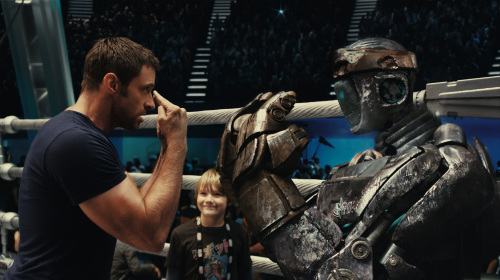“Real Steel” used real robots.
Oh, there are computer-generated robots as well, of course, in this film, opening Friday, about bot boxers in the near future. But for most scenes outside the bouts themselves, the movie crew built 26 (and a half) of what the press materials call “animatronic robots” ― a friendly phrase invoking a Country Bear Jamboree folksiness but that’s as redundant as “motorized cars.”
“They were robots, man, period!” marvels Anthony Mackie, who plays an underground fight promoter opposite hustling, hardscrabble robot owner Hugh Jackman. While radio-controlled and not autonomous, “They were full-size, 8 1/2-, 9-foot tall, huge robots that actually moved. It’s hard to focus on someone,” he points out, laughing, “when there’s a 9-foot robot behind them, looking around and moving its arms! That first scene between Hugh and I, where he comes to me looking for a fight for (his robot), we’re talking and that robot is moving and reaching over his shoulder, and whenever it was time to say my line I would be so freaked out!”

Charlie Kenton (Hugh Jackman, left) gives instructions to Atom while his son, Max (Dakota Goyo) looks on in DreamWorks Pictures’ action drama “Real Steel.” (Melissa Moseley/Courtesy DreamWorks Pictures/MCT)
“When I saw them for the first time,” Jackman said at a news conference for the film, “there’s a picture of us ― me and Dakota (Goyo, his then 10-year-old co-star) ― seeing them, and both us look like 10-year-olds. ... It’s amazing that in this world where I’m used to a green screen and a stick with a tennis ball on it” ― to give an actor a visual target of where a CGI element will be inserted later ― “that (executive producer Steven) Spielberg actually said to Shawn (Levy, the director), ‘You should really have real elements where you can.’ ... Basically, if they’re not walking or fighting, that’s a real robot.”
Ironically, such discernible physical presence humanizes the behemoths in a way you don’t get with the more cartoon-like, CGI robots of the “Transformers” movies. And that’s thematically in keeping with the low-tech, father-son story at the heart of this sci-fi family film.
“Steven Spielberg had been developing this thing for eight years,” says Levy (the “Night at the Museum” films). “Once Steven and I met, I took a big swing and said, ‘Steven, look, you’ve been trying to mount this movie a long time’ ― there was a previous director (Peter Berg), whose work I like, all goodwill there ― and I kind of declared a new paradigm for the movie: It was not going to be about robots but (would be instead) a human underdog story about a father reconnecting with his son.”
That’s decidedly different from its source material, sci-fi maestro Richard Matheson’s short story “Steel,” originally published in the May 1956 issue of The Magazine of Fantasy and Science Fiction ― indeed, the on-screen credit reads specifically that it was only “based in part on” the tale. Matheson ― whom Levy says “is thrilled with seeing the world of his story fleshed out to this extent” ― had faithfully adapted “Steel” for a 1963 episode of “The Twilight Zone,” in which broke and desperate ex-boxer Steel (Lee Marvin) and his partner and mechanic, Pole (Joe Mantell), bring their battered bot, Battling Maxo, to a small arena in Maynard, Kan., where a disguised Steel has to get into the ring and fight a robot after Maxo breaks down.
“Real Steel” keeps the Midwestern setting and unfuturistic milieu of the original, with Jackman playing the more rakishly down-and-out Charlie Kenton. An ex-boxer who coulda been a contender, he finds himself spending the summer with his estranged young son, Max. The precocious kid turns out to have the soul of a pool hustler, and after he rescues a defunct, sparring-partner robot from a junkyard, he and Dad turn the heap of metal into a scrappy (so to speak) fighter called Atom ― who gets a one-in-a-million shot against the WRB (World Robot Boxing) champion, Zeus.
Levy ― who shot in Detroit and other Michigan locations, including the 1909 Highland Park building that was the second automotive plant for Henry Ford’s legendary Model T ― says he isn’t necessarily expecting critics to be kinder to “Real Steel” than to his “Night at the Museum” blockbusters.
“It would be great to get both nice critical reaction and nice box office,” he says, “but I tried to make a movie that was rousing in the way movies of my youth were ― early Spielberg, early Zemeckis ― that weren’t embarrassed by emotionality.”
And, after all, without emotions, what are we? Robots?
By Frank Lovece
(Newsday)
(MCT Information Services)






